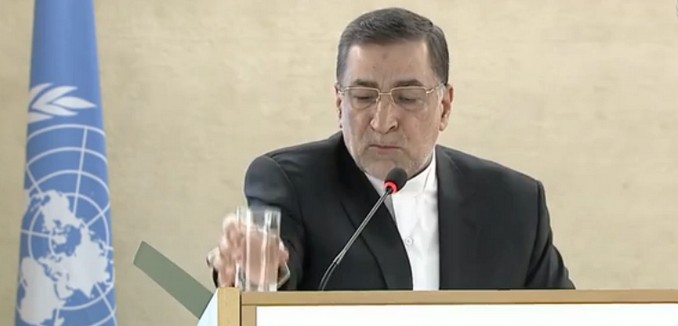Protesters gathered outside as Iran’s Justice Minister Alireza Avaei, who is under a European Union travel ban for human rights violations, spoke before the United Nations Human Rights Council, The New York Times reported Tuesday.
Avaei, who, like his predecessor, Mustafa Pour-Mohammadi, played a role in thousands of summary executions in the 1980s, was sanctioned in 2011 by the European Union for “arbitrary arrests, denials of prisoners’ rights and increase of executions” during the time he served as President of Tehran Judiciary. He was able to attend the council’s opening session because Switzerland is not a member state of the EU.
A protest organized by the National Council of Resistance of Iran (NCRI) had about a hundred people outside the council’s building. One of the protesters told VOA News that Avaei was one of those responsible for carrying out the mass killings of political prisoners in 1988 at the behest of Iran’s Supreme Leader at the time, Ayatollah Ali Khamenei.
Margot Wallstrom, the Swedish foreign minister and a number of other European officials walked out of the council’s hall in protest of Avaei’s presence. Currently Iran is holding Ahmed Reza Djalali, an academic who was recently granted Swedish citizenship, on death row.
The United States Ambassador to the United Nations Nikki Haley blasted the council for allowing Avaei to address it. According to a statement released by Haley, Avaei “is responsible for some of the worst human rights violations in Iran, including preventing political freedoms and promoting repression, violence, and extrajudicial killings of political prisoners.” Having him address the council, Haley said, “discredits” the council “by allowing serial human rights abusers to hijack its work.”
The Times reported that Avaei’s talk before the United Nations Human Rights Council came just after the U.N. released its annual report on human rights in Iran. The execution rate in Iran remains one of the highest in the world, there are severe restrictions of freedom of expression, and courts still sentence suspects to punishments such as flogging and amputation.
“By choosing a major violator as Iran’s voice on human rights,” Impact Iran, a coalition of organizations that monitor human rights abuses in Iran, said in a statement, “Iran is also making a mockery of the Human Rights Council and showing contempt for the U.N. human rights system as a whole.”
[Photo: UN WebTV ]




